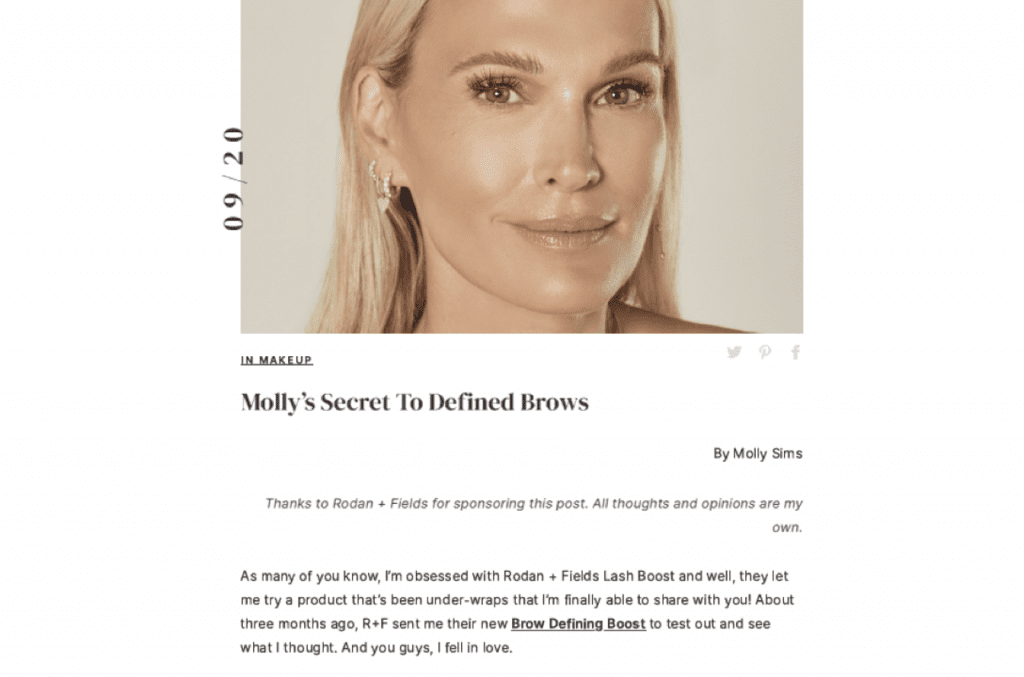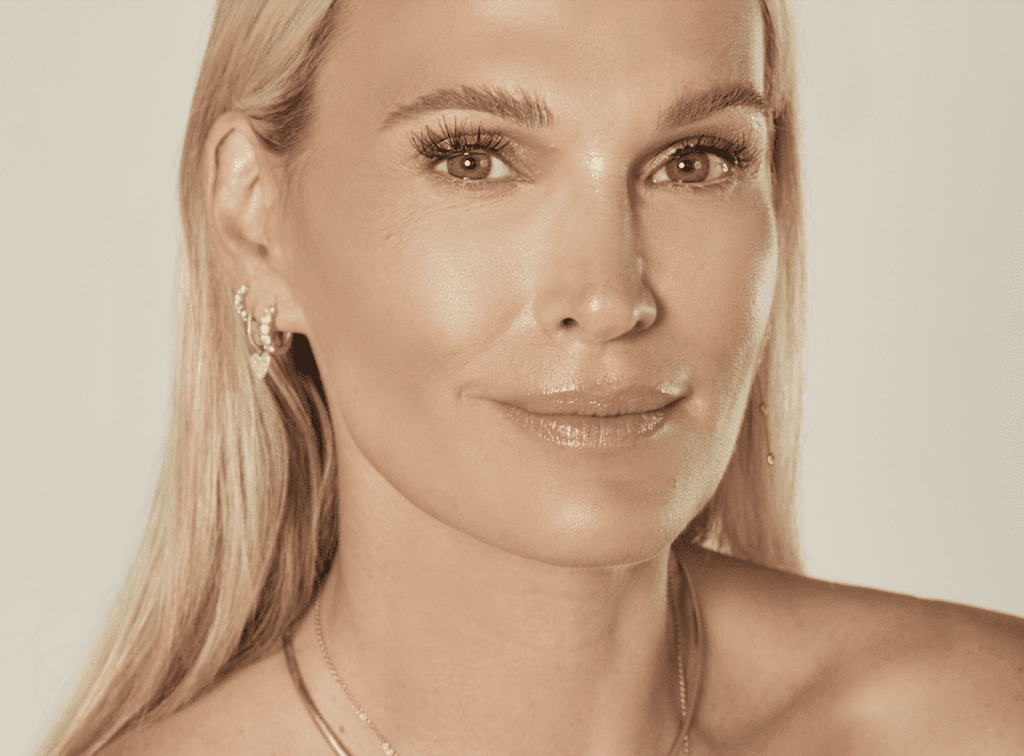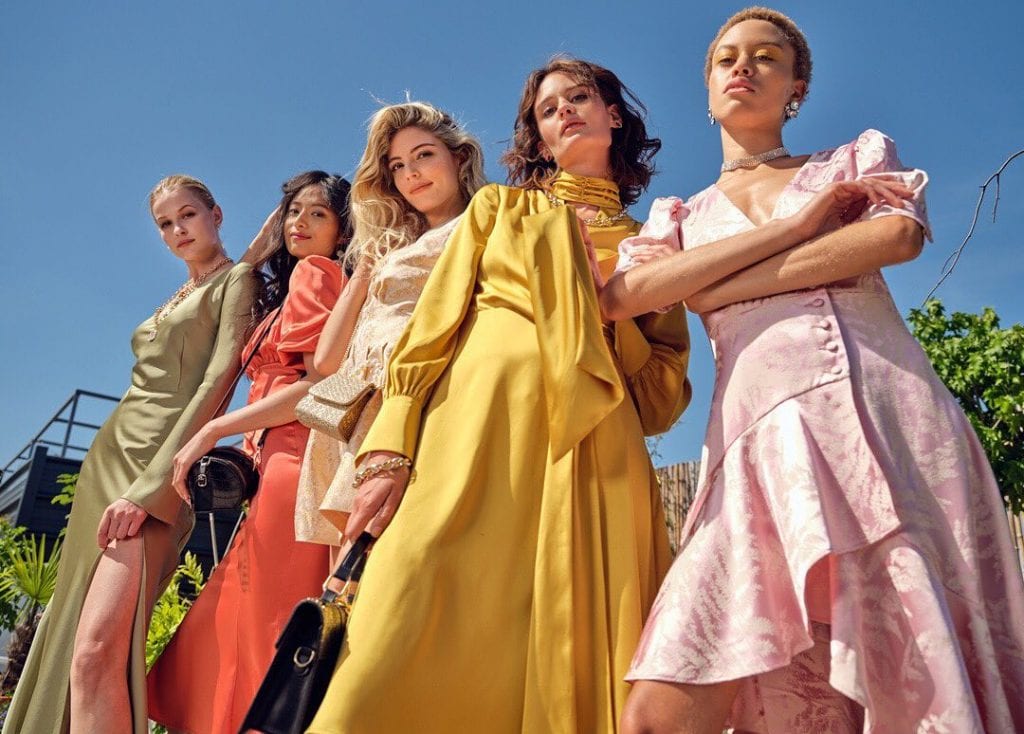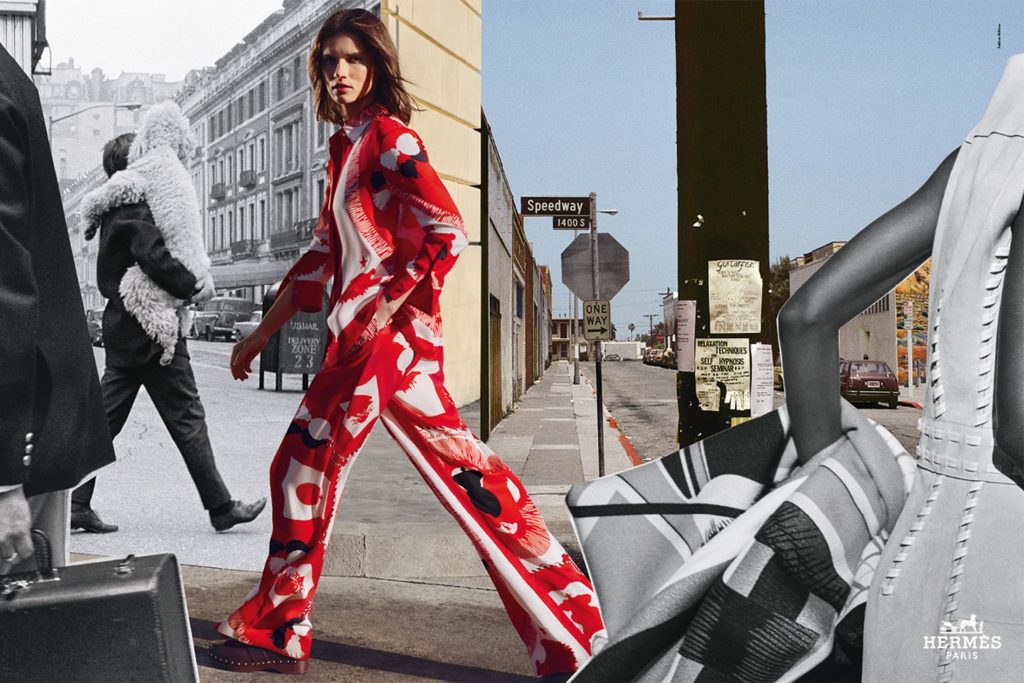Molly Sims has filed her answer to the lawsuit accusing her of infringing Petunia Products’ “Brow Boost” trademark by promoting Rodan + Fields’ “Brow Defining Boost” product in a blog post. According to the trademark infringement complaint that it filed in a California federal court in April, Petunia claims that not only is Rodan + Fields (“R+F”) on the hook for trademark infringement for making and selling the similarly-named eyebrow gel, Sims is directly and contributorily liable due to her active endorsement of the product, in connection with which she used to product name on her website and included a link for consumers to shop the “confusingly”-named product.
Sims unsuccessfully sought to escape the suit by way of a motion to dismiss in July, in which she argued, as summarized by Judge Cormac Carney of the U.S. District Court for the Central District of California, that “liability for trademark infringement should not cover third parties, like her, that author sponsored blogs about a product without confirming that the product does not violate trademark rights.” Among other things, Sims also asserted that Southern California-based Petunia failed to sufficiently show that consumers are likely to be confused about the source of R+F’s product as a result of her blog post, or that she used the “Brow Boost” mark in commerce when she published a blog post about the product, and that if a court finds otherwise, “legitimate commentary” is likely to be stifled.
In an order last month, Judge Carney refused to dismiss Petunia’s direct trademark infringement and unfair competition claims against the model-slash-beauty/wellness figure, holding that Petunia did, in fact, establish that Sims “used [its] trademark in commerce,” and that “her use was likely to confuse customers as to the source of the product.”
The judge held that Sims’ blog post is quite clearly “a paid advertisement,” and thus, amounts “to commercial use,” and is likely to confuse consumers in light of the fact that in her sponsored blog post, Sims “promoted a product which competes with the plaintiff’s product, sounds like the plaintiff’s product, and is marketed through similar channels as those used by the plaintiff.” The court was not persuaded by Sims’ argument that there is little likelihood of confusion because she explicitly identified R+F (and not Petunia) as the source of the “Brow Defining Boost” product, with Judge Carney holding that “identifying R+F as the source does not necessarily mean a consumer will not infer an affiliation between R+F and the plaintiff.”
Having shut down the motion to dismiss on more than one front, Sims filed her answer on September 7, denying an array of Petunia’s allegations, but more interestingly, setting out five affirmative defenses that shed light on the arguments that her counsel will make as the case goes forward. In addition to asserting that Petunia failed to state purported claims against her, Sims alleges that to the extent that she “is held to have used any trademark commerce by virtue of ‘advertising’ on R+F’s behalf, she lacks any control or involvement in the alleged infringement.” In other words, she did not make the product or select the name for the product, she was just paid to promote it. This argument is obvious enough.
The less straightforward defenses come from Sims’ claims that her use of the “Brow Boost” mark falls within the realm of descriptive and nominative fair use. “Ms. Sims’s use of ‘Brow Defining [Boost]’ was not a designation of source,” her counsel states. “On the product and in Ms. Sims’ blog post, it was clear that R+F was the source and that Ms. Sims was merely referring to the product as R+F had produced.” Beyond that, they argued that “Ms. Sims made no greater use of ‘Brow Defining Boost’ than was necessary to communicate the characteristics and attributes of the product Ms. Sims was asked to review,” and that “the terms ‘brow,’ ‘defining,’ and ‘boost’ are all useful terms to fairly convey this information.”

It is unclear (to me, at least) how a nominative fair use defense would work in Sims’ favor, as this form of fair use permits the unauthorized use of one party’s trademark (by another) to refer to that trademark holder’s goods. Or in other words, nominative fair use applies when a defendant uses a plaintiff’s trademark to refer to the plaintiff – and assuming that only so much of the mark as is reasonably necessary to identify the product or service is used; and the use of the mark does not suggest sponsorship or endorsement by the trademark owner. With this in mind, nominative fair use would be a suitable defense if Sims was using “Brow Boost” in her since-removed blog post to refer to Petunia’s Brow Boost product, but that is not what is going on here, as in the sponsored post, Sims is using the term “Brow Boost” to promote R+F’s product.
(As a side note, it was not all that long ago that Judge Louis L. Stanton of the Southern District of New York sided with Chanel on a nominative fair use issue in the still-ongoing case that it filed against What Goes Around Comes Around (“WGACA”). In a September 2018 opinion, Judge Stanton held that the luxury resale company’s use of #WGACAChanel does not amount to nominative fair use, as the use of its name in conjunction with Chanel’s in addition to its offer of authenticity guaranties for the pre-owned Chanel products might “suggest sponsorship or endorsement by Chanel.”
“While the Chanel case appears to instruct brands that the use of another party’s trademark in combination with their own is impermissible and does not constitute nominative fair use,” attorney Jessica Elliott Cardon noted at the time, “it provides no guidance as to whether WGACA, under the same circumstances, could have used #CHANEL or some other type of instructive hashtag incorporating the CHANEL trademark.”)
It is not terribly obvious how a descriptive fair use claim would work either. As distinct from nominative fair use, its descriptive version permits the use of one party’s trademark to describe another party’s products or services, rather than to indicate the source of those goods or services.
Is Sims using the “Brow Boost” trademark to describe R+F’s product? It does not seem so. It seems to me that she is using the BB mark to identify a specific R+F product, the “Brow Defining Boost” eyebrow gel, which is different than describing the product. (For a point of reference, R+F describes the product on its own site as a “multi-tasking brow gel [that] gives the appearance of fuller, thicker + fluffier brows over time for a younger look.”)
While the outcome is still potentially a ways away, the still relatively new case has garnered attention, nonetheless, due to its potential to open the door for other trademark holders to begin (successfully) naming influencers in infringement cases, thereby, exposing these often-critical marketing figures to direct infringement claims, which has not been a common concern in the past. With this potential outcome in mind (and given the high costs associated with litigation), sophisticated influencers – namely, ones with managers and/or legal counsel – will almost certainly push for the inclusion of indemnity clauses in their endorsement contracts in order to assure that the brand will assume the risk and liability should similar issues arise.
Ultimately, this could serve to increase the costs of such influencer campaigns for brands, which have traditionally been viewed as a more cost-effective marketing endeavor. It will also likely boost the level of diligence required for influencers and their attorneys at the outset should they aim to avoid trademark issues in connection with endorsement campaigns.











